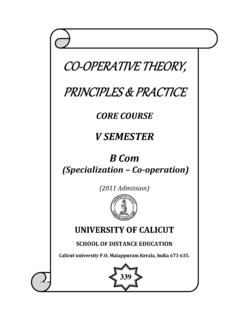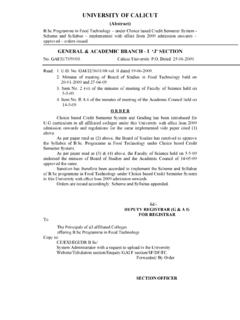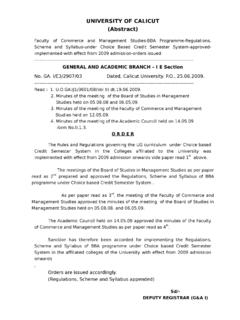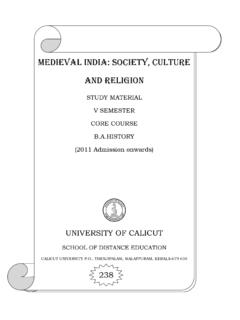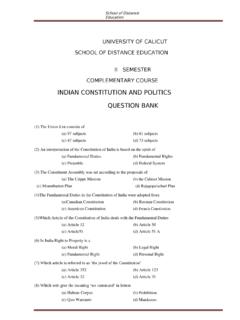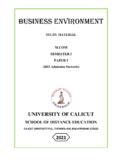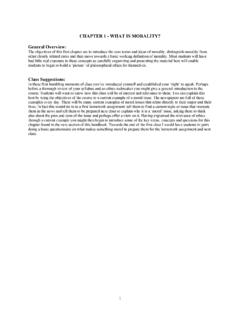Transcription of THEORETICAL PERSPECTIVES IN SOCIOLOGY
1 THEORETICAL PERSPECTIVES INSOCIOLOGYV SEMESTERCORE COURSEBASOCIOLOGY(2011 Admission)UNIVERSITY OF CALICUTSCHOOL OF DISTANCE EDUCATIONC alicut university ,Malappuram Kerala, India673 of Distance EducationTheoretical PERSPECTIVES in SociologyPage2 UNIVERSITY OF CALICUTSCHOOL OF DISTANCE EDUCATIONSTUDY MATERIALCore CourseBASOCIOLOGYVS emesterTHEORETICAL PERSPECTIVES IN Professor&Head of theDepartment,Dept. of SOCIOLOGY , ,Kozhikode.(Module I & III)Dr. Sr. Professor,Dept. of SOCIOLOGY ,Carmel College,Mala.(Module II & IV)Scrutinizedby:Dr. N. P Hafiz Mohamad, Manasam , Harithapuram,Chevayoor, :Computer Section, SDE ReservedSchool of Distance EducationTheoretical PERSPECTIVES in SociologyPage3 ContentsPage IDEVELOPMENT OF SOCIOLOGICAL THEORY5 MODULE IIFUNCTIONALIST PERSPECTIVE14 MODULE IIICONFLICT PERSPECTIVE28 MODULE IVINTERACTIONIST PERSPECTIVE37 School of Distance EducationTheoretical PERSPECTIVES in SociologyPage4 MODULE ISchool of Distance EducationTheoretical PERSPECTIVES in SociologyPage5 DEVELOPMENT OF SOCIOLOGICAL THEORYD efinitionATheory is a set of interrelated concepts used to describe, explain.
2 And predict howsociety and its parts are related to each are sets of inter-related conceptsand ideas that have been scientifically tested and combined to clarify, and expand ourunderstanding of people, their behaviors, and their societies. Without theories, sciencewould be a futile exercise. A theory is a set of propositions that provide an explanation bymeans of a deductive or inductive system. The three major functions of theory aredescription, explanation and and Characteristics of TheoryAtheoryis a proposed relationship between two or moreconcepts. In other words,a theory is explanation for why a phenomenon theories to explain therelationship between concepts, we would not be able to understand cause and effectrelationships in social major characteristics of theory are givenbelow.
3 Time boundedness: Scientific theories always seek to transcend the particular andthe time bound. Scientific theories are therefore about the generic, the fundamental,the timeless, and the universal. Objectivity: Another characteristic of scientific theories is that they are stated moreformally than ordinary language. Theory is stated inneutral, objective, andunambiguous terms so that the theory means the same thing to all who examine it. Reliability and Verifiability: A final characteristic of scientific theories is that theyare designed to be systematically tested with replicable methods against the facts ofparticular empirical of theory: Concepts, Variables, Statements and FormatsTheory is a mental activity revolving around the process of developing ideas thatexplain how and why events occur.
4 Theory is constructed with the following basicelements or building blocks: (1) concepts, (2) variables, (3) statements, and (4) there are different types of theory, the basic elements are common to of Distance EducationTheoretical PERSPECTIVES in SociologyPage6 Theories are built from concepts. Generally, concepts denote phenomena. A conceptembraces the aspects of the social world that are considered essential for a particularpurpose. Concepts are constructed from a system of terms thatinform investigators as to the phenomenon denoted by a concept. A definition allowsvisualising the phenomenon that is denoted by the concept.
5 It enables all investigators tosee the same thing and to understand what it is that is being studied. Thus, concepts thatare useful in building theory have a special characteristic: they strive to communicate auniform meaning to all those who use them. However, since concepts are frequentlyexpressed with the wordsof everyday language, it is difficult to avoid words that connotevaried meanings and hence point to different phenomena for varying groups ofscientists. It is for this reason that many concepts in science are expressed in technical ormore neutral languages, such as the symbols of mathematics.
6 In SOCIOLOGY , expression ofconcepts in such special languages is sometimes not only impossible but also the verbal symbols used to develop a concept must be defined as precisely aspossible so that they point to the same phenomenon for all investigators. Although perfectconsensus may never be attained with conventional language, a body of theory rests onthe premise that scholars will do their best to define concepts concepts of theory reveal a special concepts pertainto concrete phenomena at specific times and locations. Other, more abstract, conceptspoint to phenomena that are not related to concrete times or locations.
7 For example, in thecontext of small-group research,concrete conceptswould refer to the persistent interactionsof particular individuals, whereas anabstractconceptualization of such phenomena wouldrefer to those general properties of face-to-face groups that are not tied to particularindividuals interacting at a specified time and location. Whereas abstract concepts are nottied to a specific context, concrete concepts it is essential that some of the concepts of theory transcend specifictimes andplaces, it is equally critical that there be procedures for making these abstract conceptsrelevant to observable situations and occurrences.
8 The utility of an abstract concept can bedemonstrated only when the concept is brought to analyse somespecific empirical prob-lem encountered by investigators; otherwise, concepts remain detached from the veryprocesses they are supposed to help investigators understand. Some argue for very formalprocedures for attaching concepts to empirical events. Those of this view believe thatabstract concepts should be accompanied by a series of statements known asoperationaldefinitions,which are sets of procedural instructions telling investigators how to go aboutdiscerning phenomena in the real world that are denoted by an abstract argue, however, that the nature of our concepts in SOCIOLOGY precludes suchformalistic exercises.
9 At best, concepts can be only devices that must change with theSchool of Distance EducationTheoretical PERSPECTIVES in SociologyPage7changes in society, and so we can only intuitivelyand provisionally apply abstractconcepts to the actual the measurement system has been specified by the operational definition,different values of the concept can be observed. The concept can now be referred to as avariable, since it can respond to differences in the real world by taking on varyingvalues, as specified in the operational used to build theory, two general types of concepts can be distinguished: (1)those that simply label phenomena and (2) those that refer to phenomena that differ indegree.
10 Concepts that merely label phenomena would include such common terms likegroup,socialclassetc. Concepts that denote properties as size, weight, density, velocityetc. refer to differences in degree among phenomena. Some concepts of scientific theoryshould denote thevariablefeatures of the world. To understand events it is necessary toanalyse how variation in one phenomenon isrelatedtovariation in and FormatsTo be useful, theconcepts of theory must be connected to one another. Suchconnections among concepts constitutetheoreticalstatements. These statements specifythe way in which events denoted by concepts are interrelated, and at the same time, theyprovide an interpretation of how and why events should be connected.
